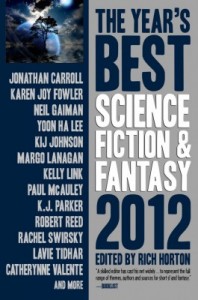 An Interview by Gina Guadagnino
An Interview by Gina Guadagnino
“Fields of Gold” by Rachel Swirsky will be appearing in Prime’s forthcoming Year’s Best Science Fiction and Fantasy: 2012 edited by Rich Horton. Pre-order here!
One of the biggest hurdles in this narrative is to convey the passage of time in a timeless place, yet you manage it so well through the use of Dennis’s lists and flashbacks. What do those two devices allow you to do with the story?
The story is functionally timeless, I suppose, because time has ended for Dennis, but I don’t see it as narratively timeless. He’s still experiencing a sequence of events that has an emotional impact for him. What he hears and when he hears it creates his revelation. I think it’s actually a pretty traditional story shape if you strip off the setting and just look at the story as a skeleton. That said, I think Dennis feels trapped; there’s a tension in the story between the fact that he’s having his midlife crisis and feeling like the time he has to live is dwindling… while at the same time, the time he has to live has both technically become nothing (since he’s dead) and everything (since there doesn’t seem to be any end to existence). I think he’s very preoccupied with time and I think the flashbacks and the lists help illuminate that part of his mental state.
In the land of the dead, celebrities behave as stereotypes of themselves, leading the regular dusties and rotters wondering whether or not they are real. What do you think?
Well, usually when I leave something like that ambiguous in a story it’s because I don’t want to come out and say definitively what’s going on. So usually I’d try to duck this question, but… yeah, in my head, the celebrities were absolutely fake. They were projections of ego and desire, not real people. I think there’s an interesting, anxious relationship that we have in America with the concept of celebrity. A lot of us want to be celebrities, but what we imagine celebrities are is a sort of two-dimensional, partial thing–and then many people judge their lives by whether or not they achieved what was never real in the first place. Dennis never got to be a rock star. But I doubt very much that his imaginary image of himself as a rock star would have had much to do with who he’d actually have been if he’d become one.
If it’s not too morbid a question, who would you most want to see at your own welcome party? I, personally, have a lot of questions for Eleanor of Aquitaine …
I think I’d be thrilled to see anyone and everyone. I don’t actually believe in an afterlife, but it would be amazing to see that people did get a chance to keep existing, did get more chances to be happy. The kids who die in wars. The people who are living their lives and, suddenly, are swallowed by a tsunami or an earthquake. My grandfather–who was kind of an asshole–it would be wonderful if he were still extant, trying to make an assay toward happiness he never achieved in life. Octavia Butler, who died altogether too young. To be more flip, I guess I’d probably do some cultural anthopology and try to chase down people from ancient cultures and ask them how they’d lived. (Lucy! I want Lucy to be at my party!) They in turn would probably tell me to screw off because they’d be busy getting wasted and playing table tennis.